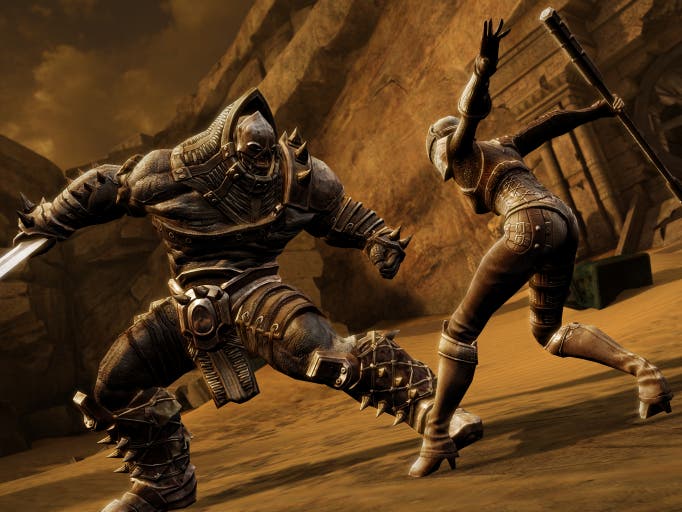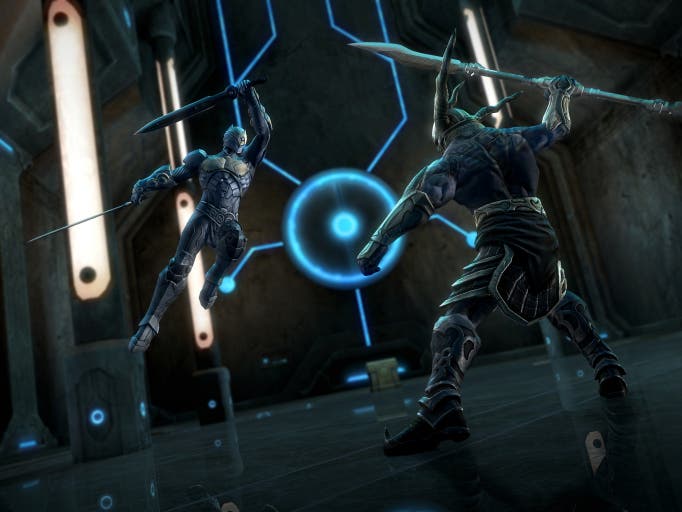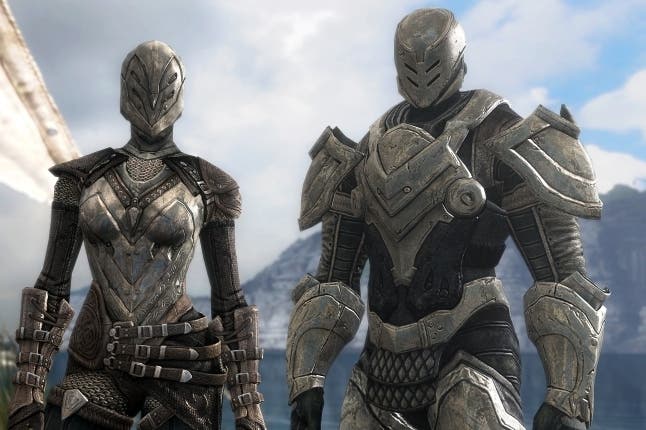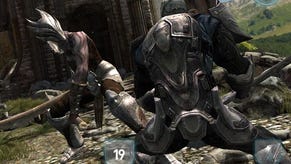Infinity Blade 3 review
Thickly sliced.
Style over substance doesn't always need to be a criticism. When the first Infinity Blade was released, back in 2010, it wasn't the deepest game around. What it did have was an engaging and intuitive approach to touchscreen sword fighting, as well as sumptuous Unreal Engine visuals designed to give purchasers of the newly released iPad something to show off. The style was the substance, and it was a well deserved hit.
Was it a game that demanded sequels? Arguably not, but the industry must be fed. Where the first Infinity Blade dressed up short, punchy mobile gameplay in AAA graphics, with this third and apparently final entry in the trilogy, the game now resembles its AAA peers in more than just looks. It has inherited their bloat as well.
Combat remains largely unchanged. You march up to some hulking foe and do battle using a variety of dodges, blocks and parries to wear them down before unleashing your own flurry of blows in the few seconds before they regain their composure. It's muscular, satisfying stuff, made all the more enjoyable for its immediacy. Swiping to meet an incoming blow results in a clanging parry, tapping the corners sends you ducking left or right. It just feels right, and once you've found the rhythm of each enemy these encounters are a cinematic joy, rightly forming the meat of the game.
Trouble is, this time around, you need to wade through a lot more mushy veg and gravy to get to that meat. As with any game where the core mechanics worked fine first time out, Infinity Blade 3 finds developer Chair piling on more stuff, filling in the margins with additional tasks, and generally elongating the experience by any means available.

There are two characters now. Regular hero Siris is joined by the lithe Isa, a female assassin who stings her opponents with a quick crossbow bolt before fighting in a more acrobatic style, her smaller blades forcing her to favour stabs, kicks and dodges over blocks and brute strength. The mechanism by which you fight is practically identical, however, so while the game's presentation does a good job of making the fighters feel different, it's more a variation on a familiar theme than a completely new way to play.
Some of the game's stages are unique to a particular character; others are designed to be replayed with both, often several times over. These stages are now accessed from a central hub, a remote cove where Siris and Isa hang out with a bunch of vendors who will brew potions, craft gems and gear and sell rare loot.
It's here that some of the more unwelcome aspects of mobile game design start to bleed in. Crafting and potion-brewing use a cooldown mechanic that would feel more at home in a craven free-to-play title than a premium-priced game like Infinity Blade. Countdowns can last anything from five minutes to 24 hours, and all can be skipped by cashing in the crystals that, along with more traditional gold coins, form the game's intertwined currencies.
There are "prize wheels" that can be purchased which bestow random loot, a mechanic that crosses from quirky diversion to dispiriting lottery once you're paying for them with real money. The game is obliged to keep teasing you with stuff you don't really need, but almost always want, like the chocolate bars placed at the supermarket checkout to ensnare parents with truculent children into an impulse purchase. You can also buy expensive keys to unlock tantalising chests; you'll be forced to leave behind dozens of potentially lucrative treasure troves if you don't fork out, because the game only hands out free keys for the really good chests sparingly.
Infinity Blade now resembles its AAA peers in more than just looks. It has inherited their bloat as well

You'll earn enough gold and crystals through normal play to do some of this and to buy decent gear, but that makes it a weirdly redundant system. Insanely over-powered weapons and armour that essentially break the gameplay balance are perpetually available, purchased directly from your inventory, if only you'd splash out a few more quid on top of the fiver you've already paid for the game.
Unlike the worst free-to-play offenders, in Infinity Blade 3 this only impacts the game if you let it. But then why include it at all? The pleasure of the game comes from the clash between evenly matched warriors. If you can destroy every foe with a few slices of your just-purchased elite arsenal, the very core of the game collapses. As such, Infinity Blade 3 feels awkwardly adrift between the hard-earned progression of a traditional RPG and the 'have it all now for a price' mentality of freemium, actively undermining itself at the player's whim in order to flog some virtual coins.
Infinity Blade always had an element of grind built in, sending you back to level up some more until you stood a chance of defeating its boss characters. With an in-app purchase economy to feed, that grind now takes centre stage in a game that - the bullet points boast - is eight times the size of the original. For a game like The Elder Scrolls or Grand Theft Auto, that's a selling point. For a game built on the shoulders of a single idea - swipe-based melee combat - it's just too much. This is gameplay best served in small, punchy, arcade-style bouts, not in a sprawling epic.
That melee combat is still strong and enjoyable, but the additions made here mostly sit around that core rather than enhancing it - the very same problem that blights top-heavy blockbusters like Assassin's Creed, where the accumulation of stuff is mistaken for evolution in design. It's hard not to look at the canning of the planned dungeon-crawling spin-off Infinity Blade: Dungeons and wonder how many of its aborted ideas have been tacked on here.
The primal joys of a perfect parry followed by a killing blow against a hulking monster mean that Infinity Blade 3 was always going to be good fun where it counts. But between distracting feature creep and the inclusion of in-app purchases just because everyone else is using them, it feels like a game that exists more to serve a publishing agenda than an essential closing chapter in a coherent trilogy.


